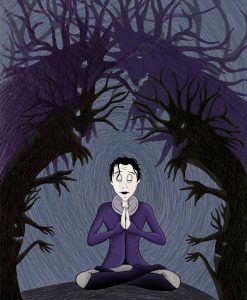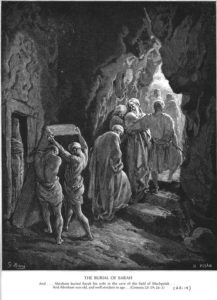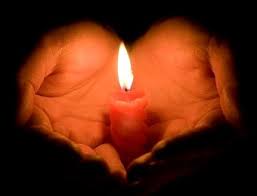Category: Grief
#BringThemHome
This Shabbat I share this duet from the Tel Aviv Opera. Bring them home now. May the hostages be safe and be returned to our family.
Shabbat Shalom
Forging a Path Forward- Parshat Shemini
If you can keep your head when all about you are losing theirs and blaming it on you…(If, by Rudyard Kipling)

How do I handle competing demands? What do I require for myself, and what do my obligations to others require? This delicate balancing act requires profound self-knowledge based on the preparation that helps us reconcile the sometimes competing if not outright conflicting, needs. Aaron demonstrates how to navigate these tricky waters in Parshat Shemini.
We encounter this repeatedly in our life journey; the competing demands of work and family are familiar to all of us, and we often find we can do only one at the expense of the other. Which takes priority? Can they weave together? This is our dilemma.
The answer is grounded in self-understanding.
The Talmud often weaves its machloket (discussions) around understanding competing values, holding two things in tension, and understanding the core values under different circumstances. We study and learn about who we are, what grounds us, and what motivates us, sometimes creating a hierarchy placing specific values above others. Contemplating the question, “Who am I?” even in troubling circumstances, we maintain ourselves and do not get consumed by the events but move through them, as complicated as the test may be. That is Shemini.
The Eighth Day, Shemini, is momentous; Aaron is to be initiated as High Priest. But by singling out the eighth day, the Torah shows us that the seven days preceding it are also significant–they constitute the formative period that brings us to a critical moment and beyond.
Aaron and his sons underwent thorough planning to assume the priesthood. Moses remained High Priest until he was assured that the training was complete and Aaron and his sons were fully ready. And then, catastrophe.
Nadav and Abihu approached God with “alien fire” and were themselves consumed. We ask ourselves why, and we wrestle trying to understand. If the crime was drunkenness, as our texts and commentators suggest, the punishment of death seems extreme. Perhaps we are trying to explain the unexplainable.
The deaths of Nadav and Abihu may have been just that; a catastrophic event that seems capricious and arbitrary. Such things happen all the time. Therefore, the question is not why this happened but how we respond when disaster comes.
We cannot imagine the overwhelming shock and pain Aaron experienced, but we can conjure ideas of how we might respond. Break down in overwhelming grief, rail against God, fall on his face and rend his clothes, publicly grieve the loss of his sons, go off to be with them and bury them, and turn his back on the priesthood. The list goes on. But that is not what Aaron did.
Aaron remained silent, although shaken to his core at the brutal death of his two sons. The commentators struggle with this silence. As a father, his initial instinct would be to mourn his two sons’ loss immediately. Nachmanides, the 13th C. Sephardic commentator, suggests the silence came after he stopped crying. Rashbam, the 12th C. commentator from Northern France and Rashi’s grandson, explains that Moses intercedes, reminding Aaron he must continue the sacred service already underway, as Aaron was just invested as High Priest and charged with the well-being of the entire people.
Wisdom is usually considered the province of the elder. The hoary head of age is a badge indicating a lived life and the experiences of that life. But experiences are merely knowledge. Once we acquire knowledge, we must embrace it as a life lesson and part of our value system and then judiciously offer it to circumstances in the future; only then can we claim to possess wisdom. Aaron arguably attains wisdom. It is borne from a horrific experience and will guide him throughout the rest of his journey.
Our commentators focus on the verse that explains drunkenness. Rashi sees this as God speaking directly to Aaron, a reward for maintaining his comportment. I suggest it is Aaron comprehending the wisdom of priesthood and the particular responsibilities of that responsibility. This wisdom is for him and the others of the priestly class and as a model for the rest of us.
The people look to Aaron as an exemplar and intercessor with God. This unique stature required Aaron to maintain his composure and dignity, continuing his work in the face of this loss. However, Aaron does not participate in the offering and, in this separation, remains connected to his sons as a mourner.
We have all encountered the moment of decision. There are two paths forward, forcing us to choose the most critical. Although many of us could not comprehend how Aaron could continue his priestly duties, many of us understand there was no other way forward for him. Regardless, we must understand ourselves well enough to determine what we would do when faced with such a test.
Only through preparation or self-awareness can we know how to respond to crises, calamities, or even the everyday things that require tradeoffs. These are not the choices of good versus evil. They are the more nuanced choices, often of good versus good, that are more complex and difficult. How do we maintain who we are and uphold the values we hold dear if we have yet to explore either concept? Only through knowing one’s self can one authentically move forward.
Ironically, the verse from Deuteronomy (30.19) resonates in such complex space, “I call heaven and earth as witnesses today against you, I have set before you life and death, blessing and cursing; therefore, choose life, that both you and your descendants may live.” Therefore, we need to understand the meaning of choosing life. Indeed, even the unspeakable horror of losing a child still requires us to find a way forward in our lives and for others.
This is dynamic and constantly changing, yet, we continue to live and grow broadly from our experiences on this journey. Our self-understanding evolves, and wisdom permits us the opportunity to navigate a path forward.
The Ark in the Noah story is a craft beholden to wind, rain, and sea currents. It bobs on the water until it finally hits land. A sailboat, on the other hand, is different. Although it, too, is subject to the currents and constantly being pushed off course, it has rudder, keel, and sails. With these tools, the skilled and prepared pilot keeps the ship following the stars toward the intended destination. So too, can we as we grow older and wiser. We’ve prepared for the journey and its eventualities and can respond with that wisdom. This is the message of Shemini.
Shabbat Shalom
Shabbat closes a painful week both here and abroad.
El Na Refa Na La- the prayer for healing is our prayer that healing of the broken may be. May this Shabbat bring you peace and wholeness, and may we find ways to reach out to you.
Shabbat Shalom
Shabbat Shalom
Set at the Shoes along the Danube Bank, the Hungarian Sabbathsong Klezmer Band shares “Sh’ma Yisrael.”
Shabbat Shalom
When the heart cries, only God hears it
The pain rips from my soul
A sigh breaks the silence
And you fall on your knees while you pray
R: Hear, O Israel, O Lord Almighty
I thank you for my life, I thank you for everything
The mouth moves silently, but my spirit cries out
My heart cries silently, and I pray for you
Hear, O Israel, O Lord, do not let me fear now
(Behold) the guardian of Israel does not slumber, he does not sleep
The pain is great, but I can’t run away
Because I don’t even have the strength to speak, now I need a miracle.
Yitgadal v’yitkadash shmei rabba
Shabbat Shalom- praying for peace
Oseh Shalom Bimromav, Hu YaAseh Shalom Aleinu
v’ akol Yisrael, V’akol yoshvei tevel
V’imru Amen
Shabbat Shalom
Shabbat Shalom
At this difficult time, we pray for peace. And as we pray, give generously to alleviate some of the suffering- reach out to the JDC, Doctors without Borders, World Union for Progressive Judaism, or whichever group you know is trying to reach those in need.
Shabbat Shalom
I hope that this Adon Olam, composed by Cantor Pinchas Minkowsky (1859-1924) of the Brodsky Synagogue in Odessa inspires your prayers and actions for peace in Ukraine. Praying for the safety of the Ukrainian people and wishing you a Shabbat Shalom
What is the right way to mourn?
In Judaism, it is pretty straightforward. We have a series of rituals and traditions that serve to guide us. But the answer is more nuanced depending in considerable measure on who you are and the relationship to the deceased.
 Judaism compels us to “do the right thing.” It is one of our tradition’s great insights. Doing what we are supposed to do is affirming the bereaved’s humanity and sense of ethics. Even if the relationship was fraught, Judaism provides the ability to rise above circumstances instead of becoming a victim to circumstances.
Judaism compels us to “do the right thing.” It is one of our tradition’s great insights. Doing what we are supposed to do is affirming the bereaved’s humanity and sense of ethics. Even if the relationship was fraught, Judaism provides the ability to rise above circumstances instead of becoming a victim to circumstances.
In this week’s Torah portion, Chayei Sarah, we read that when Sarah died, Abraham wept (Genesis 23:2). But as is the case with Torah, there is more here than the words of the verse. The Torah has one of the letters of the Hebrew word for wept, livkotah, the kaf, printed physically smaller than the other letters. Our sages saw this as purposeful and concluded that this indicated that Abraham cried only a little. Why would Abraham not weep fully?
Perhaps he was overcome by guilt, bearing responsibility for her death. Midrashim tell of Sarah dying of a broken heart when she learns Abraham took their precious son Isaac and sacrificed to God on Mount Moriah. And to further compound things, Abraham knows in his heart that he would do the same thing again to prove his loyalty to God.
There are many reasons why we are unable to be fully present when we experience loss.
For example, Abraham negotiated for the burial cave and immediately focused on sending his servant to find a wife for Isaac. Most of us have experience with people focusing on funeral planning as a means of diversion from confronting the pain of loss. And many people experience complicated grief or ambivalence over the death of someone ostensibly close.
Our tradition offers us a roadmap of sorts when for the process of death and grief. My teacher Rabbi Dr. Michael Chernick wrote that we have obligations and responsibilities as the surviving loved one. Whether we loved them or even liked them, whether they were good to us or not, for our own sake, we need to do certain things on behalf of those who die. So we learned that despite Abraham’s weeping, or lack thereof, he purchased the cave at Machpelah and buried Sarah there.
As a rabbi, I am often asked how do I bury my loved one correctly? The fact that someone would ask means that, on some level, they already are. Together we can explore ways to help them.
But that is different from dictating what to do or how to feel. We have a framework. The task is to understand how our tradition can provide the honor of the deceased and comfort for the bereaved.
Recently, two adult children asked me to officiate the unveiling for their father. Then they changed their minds, cavalierly saying that as only a couple of prayers need to be spoken, they could do it without the expense of a rabbi in attendance. Besides, he (their father) never would have won father of the year.
As I listened, I knew that they would honor their father, but I also knew they were about to miss out on that crucial second piece of our tradition’s wisdom, finding their comfort. We spent some time talking as I was wearing my chaplain’s kippah. But I didn’t press. I hoped they might process the unveiling and the loss in a constructive way and bring them comfort and healing.
How do you process complicated grief? Abraham demonstrates that the question has been around for a long time. So may we find comfort in our memories of those deceased as we embrace the idea that they may be for us a blessing.
To Mom, Zichronah Livracha- a toast with Chocolate Milk
 A small gathering of family said goodbye to the matriarch this past Sunday. Adult children and wives, adult grandchildren, and a “bun in the oven.” I was asked to officiate because that is what the family believed mom would have wanted. They and their mother understood themselves in a humanist way, but they believed it was the appropriate honor for mom- to bury her Jewishly. The boys never had a chance to have this conversation with her as she had dementia that ravaged her by the end.
A small gathering of family said goodbye to the matriarch this past Sunday. Adult children and wives, adult grandchildren, and a “bun in the oven.” I was asked to officiate because that is what the family believed mom would have wanted. They and their mother understood themselves in a humanist way, but they believed it was the appropriate honor for mom- to bury her Jewishly. The boys never had a chance to have this conversation with her as she had dementia that ravaged her by the end.
I did my best to honor her and those who were trying to honor their mother by weaving rituals with stories that each family member was eager to share and reluctant to stop. This beautiful family time ended by raising a glass of chocolate milk, mom’s favorite drink, toasting her life and the family that is her legacy.
As I was preparing to leave, the sons presented me with the replica Torah Scrolls given to each of them by the rabbi from their Bar Mitzvah. They found them among the few possessions mom brought with her to the care facility.
May her life be for a blessing.

